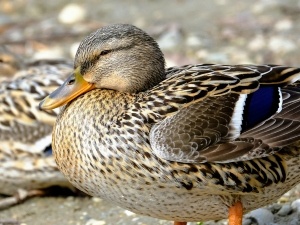
To some, ducks walk in a very weird way, ducks waddle because their feet are designed to paddle in water not walk like human feet are. This design makes them walk in a characteristic waddle, this is normal.
What isn’t normal is the bird being pigeon-toed. If your bird is pigeon-toed, then this article will be of help to you.
Table of Contents
Pigeon-toed duck:
A duck that is pigeon-toed will walk with its feet facing inward. While this isn’t normal it is something that birds can suffer from. Here is what you need to know about this condition and what causes it:
Uneven growth:
Pigeon-toedness can exist in younger ducks that are still growing. A pigeon-toed duck may stumble over itself because of how its legs are positioned.
The bird is likely pigeon-toed because its feet and legs are growing faster than its body, the bird’s hips are most likely not wide enough to accommodate for this.
The bird’s legs will be crammed into its small hips and this will cause its feet to point inwards
What to do:
This isn’t something to worry about in the early weeks of the bird’s life, it is simply something that happens to some ducks and not to others.
You don’t have to worry in this case, let the bird be and allow it to grow to allow the bird’s body to catch up with how fast its legs are growing.
You should however start to worry if the bird isn’t growing at all. You should also start to worry if the bird isn’t starting to look normal after about four weeks of life.
The bird may have a niacin deficiency if the bird inst growing or isn’t growing normally after 4 weeks of life
Niacin deficiency:
Another reason why your duck’s feet may be turned inward is if the bird has a niacin deficiency. Niacin is also called vitamin B3 and it is needed for the healthy growth of ducklings.
If a bird is stuffing from a niacin deficiency then the bird will be pigeon-toed, the bird will also lay down often, have stunted growth overall, and will be weak. Some pigeon-toed ducks will also try to move around using their wings to support themselves.
These symptoms will develop gradually in your bird if it is suffering from this condition.
A niacin deficiency in ducklings can develop in the bird if you feed them chick feed, this deficiency can develop because chick feed doesn’t contain enough niacin for ducklings.
Ducklings need 2-3 times more niacin than chicks, so feeding the ducklings chick feed, which has been developed to meet the needs of growing chicks, not ducklings, is not recommended.
If you’re feeding all your duckling’s waterfowl-friendly feed, but one, or some, birds are still pigeon-toed, then it means that these birds in particular simply need more niacin in their diet than the others to grow properly.
What to do:
You’d need to supplement niacin into your bird’s diet to fix the problem.
This needs to be done before the bones become permanently deformed. If the bird’s bones become permanently deformed then giving the bird niacin supplements won’t help.
If you catch this condition early enough then you can offer the bird’s vitamin B supplements, the ones used for cattle usually work well for ducklings.
Human niacin supplements will work well too, mix the contents of these with water and give them to your birds.
Some birds won’t readily ingest these supplements as they don’t like the taste. You can get around this by mixing the niacin supplements into your bird’s favorite treats and then feeding these treats to your bird.
Duck treats that work well in this situation include peas, mealworms, lettuce, and watermelon.
You also have the option of adding the supplements into the bird’s feed in small quantities and feeding this mixture to your bird throughout the day.
You can also quickly deliver the supplement through a syringe directly into the bird’s mouth. This is usually done if the bird’s condition is very bad
Recovery:
The supplements will take some time to get the bird’s leg straight. Isolate the bird and give it access to its own food and water while in isolation.
It takes a lot of niacin to make the birds overdose but this can happen. A sign that your bird is overdosing on niacin is digestive issues so look out for this while treating your bird.
If you enjoyed this article then you may also be interested in other chicken related articles. Here are some articles that you may be interested in: Bow-Legged Duckling, Beak Rot In Ducks, Callus On Duck’s Foot, Black Spots On Duck Bill, Black Spot On Duck Foot

